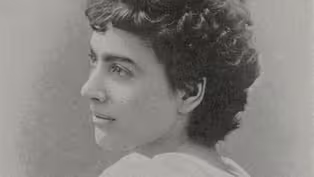The Woman Who Invented Monopoly
Clip | 5m 28sVideo has Closed Captions
Lizzie Magie was a radical who created a game that eventually became Monopoly.
Lizzie Magie was a radical who created a board game as an anti-land ownership teaching tool that eventually inspired Monopoly. Learn more in this excerpt from American Experience's Ruthless: The Secret History of Monopoly.
Problems playing video? | Closed Captioning Feedback
Problems playing video? | Closed Captioning Feedback
The Woman Who Invented Monopoly
Clip | 5m 28sVideo has Closed Captions
Lizzie Magie was a radical who created a board game as an anti-land ownership teaching tool that eventually inspired Monopoly. Learn more in this excerpt from American Experience's Ruthless: The Secret History of Monopoly.
Problems playing video? | Closed Captioning Feedback
How to Watch
is available to stream on pbs.org and the free PBS App, available on iPhone, Apple TV, Android TV, Android smartphones, Amazon Fire TV, Amazon Fire Tablet, Roku, Samsung Smart TV, and Vizio.
- Part of Ralph's strategy is to prove that the Monopoly trademark is dubious.
So Ralph is on a mission to piece together Monopoly's early history.
Trying to find out what happened with the game before Parker Brothers started to sell it.
- And then one day, Ralph is working at home, and his son Mark comes running into his office.
He says, "Dad, Dad, there's this book I've been reading and it says that Monopoly was invented by a woman.
This woman, Lizzie Magie."
And Ralph is like, "Wait, who's Lizzie Magie?"
(dynamic music) - Elizabeth Magie was born in 1866, in Macomb, Illinois.
Her family was very political.
Her father was a very influential newspaper owner.
He was one of the early founders of the Republican party.
He had traveled with Abraham Lincoln during the Stephen Douglas debates.
She was exposed to a lot of big ideas.
And at a time when women were not afforded many opportunities to be in the public space, she took every single one that she could.
She was an actress.
She was politically very active.
- She is a writer, and she produced plays, and she also invented a way for typewriters to move paper more efficiently.
- I think of Lizzie Magie as a performance artist in some ways.
I'm serious.
'Cause how do you classify her, right?
I mean, she's an engineer.
She's a poet.
She's a writer, she's an activist.
She's a staunch feminist.
- She is doing all of these things that a lot of women in that time were not allowed to do, or able to do.
She was really pushing boundaries.
(jaunty music) - In 1906, she's living in Chicago.
And she puts out a newspaper ad describing herself as a young woman American slave.
The idea is that she's selling herself to the highest bidder.
And to her dismay, people actually put forward offers.
But the idea of this is completely performance art.
And so she was trying to show how poorly women are paid relative to men.
And how difficult it is in particular to be an unmarried woman in America.
- She was a social rebel on many fronts.
And she used shocking performance and play to throw counterintuitive ideas into society.
- During the Gilded Age in the 1890s, or early 1900s, when capitalism was highly unregulated, if you had a dominant position in the marketplace, you could dictate price and availability.
- These big industrialist millionaires dominated industries in the US.
And they became monopolists in their field.
- And so people who had it made, they're wealthy, employed lots of servants, had lavish homes.
And everybody else struggled to get by.
- Lizzie Magie, even in the early 20th century, before the Great Depression, is seeing poverty and inequality everywhere.
And so much of that poverty is organized around land monopoly.
The idea of people being able to own land and extract immense amounts of profits from the working class.
(dramatic music) - Lizzie Magie sees this income inequality.
The rich getting richer and the poor getting poorer.
And she becomes an impassioned follower of Henry George.
Henry George was a hugely influential public speaker and thinker of his time.
He published a book called "Progress and Poverty" that was a massive, massive bestseller.
- There's an estimate that as many as 5 million of his books are sold during his lifetime.
- [Mary] He was really interested in land, landlords, property, ownership, and how should that be taxed?
- George, like many people before and after him say, "Land's not something anyone's ever made.
It's a gift of God and it belongs to all of us."
- We think of the American dream as owning a home.
Well, it was back in the 1890s.
But it was out of the reach of most people.
They had to rent.
And the landlord, according to Henry George, was the devil.
- He sees rent and growing property values as a source of inequality.
His solution is what his supporters eventually call the single tax.
- The single tax.
- The single tax.
- The single tax.
This is the Georgist idea that you would tax land at such a high level that it would essentially be communal and nothing else would have to be taxed.
For George, this wasn't like an anti-capitalist statement.
This was more about fairness.
This was more about leveling the playing field.
- Lizzie Magie wanted to make Henry George's point clear.
Not everybody's gonna read a political tract.
She had a genius idea.
She wanted to make it visible through the dynamics of a game.
(dynamic music)
The Woman Who Invented Monopoly
Video has Closed Captions
Clip | 5m 28s | Lizzie Magie was a radical who created a game that eventually became Monopoly. (5m 28s)
Providing Support for PBS.org
Learn Moreabout PBS online sponsorshipSupport for PBS provided by:














